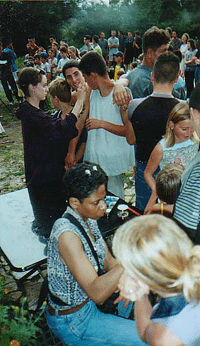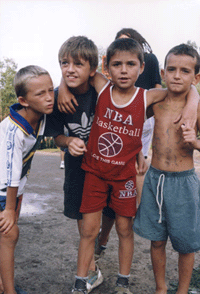
Mach's dir selbst!
Crossing Bridges
CROSSING
BRIDGES FESTIVAL
FINAL REPORT
2001 , Date 26 September, 2000
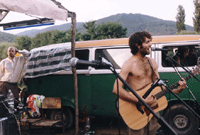 |
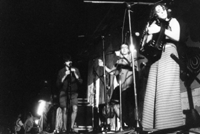 |
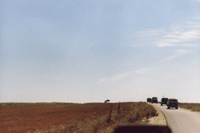 |
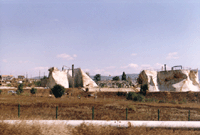 |
Contact Information
Crossing Bridges Collective Kosova Center for
Human Rights Kosovar Youth Council
Casey Cooper Johnson (festival coordinator) Dr. Neshad R. Asllani Kushtrim
Sheremeti (festival co-coordinator)
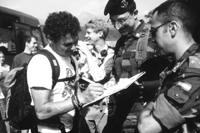 |
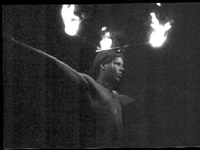 |
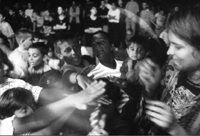 |
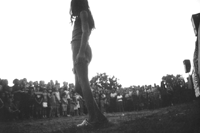 |
Theme
In Autumn of 2000, the founding members of the Crossing Bridges Collective
began serious discussion over the idea of the then unnamed multi-national,
multi-cultural, multi-dimensional arts festival for the summer of 2001
to be held in Pejë, Kosova. We aimed to create a forum of exchange
between artists of different forms, styles, and ethnic backgrounds throughout
the Balkans and Europe, and then the world beyond, and to bring them together
in Kosova for a one week festival tour. Post-war Kosova holds a unique
mixture of strong traditional culture with a growing influence of modern
culture and lifestyle amongst the wide generation of youth. Rather than
rigidly protesting the modern world which holds opportunity for economic
growth and positive social progress; rather than discard the century old
traditions and religion and music, all of which hold a rich value for
family and life, in exchange for a newer image more resembling Western
nations, Kosova carries a possibility to bridge and unite the old and
the new, the traditional with the modern, and furthermore to unite people
of different nations, even of those who have in the past warred with each
other, to unite us around the common need to gather and release our spirits
through artistic expression. This was the utopic vision of the Crossing
Bridges Festival.
Organization
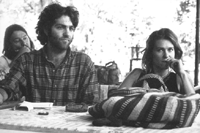 |
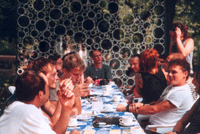 |
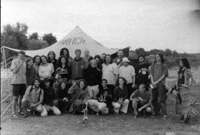 |
Organization was made between several individuals representing various
organizations and institutions. Making a general coordination of the festival
was Casey Cooper Johnson, an American resident in Pejë. Coordinating
foreign groups to participate was the role of the Playground Collective
from Frankfurt, Germany. In charge for promotion, public relations, and
volunteer support was Kushtrim Sheremeti of the Kosovar Youth Council.
The Kosova Center for Human Rights, Pejë took the role of administrative
oversight and logistic support for the festival. The Pejë Department
of Culture arranged official authorizations, security, and accommodations
for the visiting artists. The entire body of organizers became unofficially
known as the Crossing Bridges Collective.
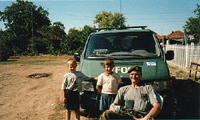 |
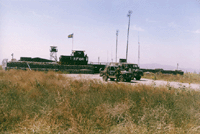 |
 |
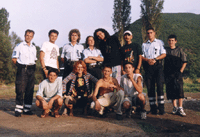 |
Fundraising
It was decided that the festival, which needed considerable funding itself,
would also be utilized as a fundraising event for the continuation of
the Crossing Bridges summer camp in the Rugova Mountains of Pejë,
which is put on each year by the KCHR and Pejë Municipality. All
organizing members took on the challenge of fundraising. This began in
Spring 2001 with Playground Collective selling a compilation CD in promotion
and benefit for the Festival. Revenues were minimal but useful in gathering
attention of other donors, such as the City of Frankfurt, which supported
travel costs of German artists. Throughout the summer, several international
and local NGOs were approached as well as government institutions and
local businesses with project proposal and budget request.
Sponsors
Our financial support for the first Crossing Bridges Festival was provided
by Kosova Foundation for Open Society, Pejë Beer Factory, Kosovar
Initiative for Democratic Society, Radio/TV Dukagjini, Premium Internet
and Siguria Insurance Company. Exact donations are shown in the financial
report. The total amount of sponsorships for the festival was about one
third of our projected budget request. Our general failure to gather more
support is due in large part to our making fundraising efforts too late
in the process, something which should be done 6 months prior to the festival.
Also, as this was the first festival of its kind in Kosova, many potential
sponsors were hesitant to take such a risk and preferred to see how this
year's event succeeded. We give a special and deep thanks to our sponsors
for investing in the dream of a rich multi-cultural world through their
support of this festival.
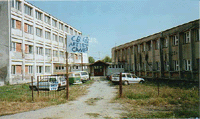 |
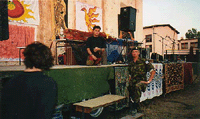 |
 |
Supporting groups
The festival received additional support from several groups. KFOR provided
bus transportation for the artists traveling throughout the 5 day tour
after the Pejë event. THW provided support with generators for the
festival and tour. Pejë Video Teens made TV promotion for the festival
and film documentation of the festival and tour. Lone Wolf Studio made
video and live projections for the festival. Balkan Sunflowers organized
children's activities for day festival in the park and made exhibits of
art and photography. Coopi organized sanitation and cleanup of the park
and festival area. The Cooper Family provided spiritual and emotional
wisdom and support throughout the process.
Promotion
For promotion of the festival, Nekra Art Studios was hired to design posters,
tickets, and t-shirts. Dukagjini provided printing of posters and tickets
free as a sponsorship. Ylber Magoni of Prishtine was hired to distribute
all posters around Kosova. Meanwhile, Dukagjini assisted in production
of a radio advertisement for the festival, which was played on several
radio stations for one week. The Peja Video Teens produced a TV advertisement,
which was also shown on TV stations such as RTV 21, RTK, and Dukagjini.
Kushtrim Sheremeti oversaw promotion aspects. Members of the band, Petrof,
were hired to oversee distribution and selling of tickets in cafes throughout
the major cities of Kosova.
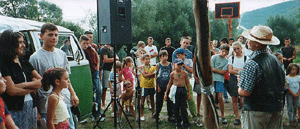 |
Festival
The festival was established on 25 August in the Karagac Park for the
day program and the adjacent Karagac Camp for the evening program. MMC
Kosova was hired to build the stages for the festival and to design stage
scenery. Three stages in all were used for the festival. Geza Music Man
Live and Studio company was hired to provide all sound and technical support.
Lone Wolf Film Studio donated live video projections for the night concert.
Volunteer staff was organized using members of the Kosova Center for Human Rights, The Kosovar Youth Council, the international members of the Crossing Bridges Collective, and members of the Balkan Sunflowers. KPS police officers provide security for the event. ElectroKosova power company allowed electricity to stay on for the entire duration of the festival, which lasted 18 hours in full.
|
The day program ran from 12 noon to 6 pm, and consisted of several venues. At the lakeside stage, the festival was opened by the Peja Department of Culture and was followed by performances by Rugova Ensemble, Mic Sokoli (Gjilan), Dodona Theater, Shropshire Music Foundation (Gjakova) and several youth dance and music groups. The Peja Video Teens made a film exhibition and interviews with people at the festival. Balkan Sunflowers organized art and photo exhibitions and activities. Vendors were on location selling local made crafts and refreshments. An information tent distributed tickets, t-shirts, and useful program information. The French puppet theater group, What's This Circus, made live puppet theater show at a special side stage location. At the end of the day festival, a performance parade was made through the main streets of town with the theater performers and jugglers from Germany and Croatia.
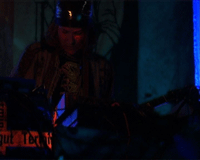 |
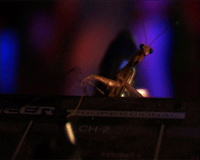 |
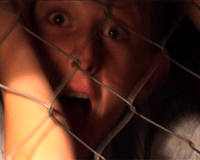 |
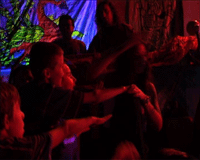 |
The evening program began with live musical acts from Petrof, Urban XXI, Zanziband, and Geza with Friends. Dance performances were made in between the bands' music sets. The Passion of Birthfire, an original theater play made by the Cooper Family with Kosovar actors and musicians, was premiered on the theater stage at 10pm. Following the theater performance, Faton Macula Band, Blla Blla Blla (Skopje) and Mescla (Italy) performed on the main stage. At 1am, a live fire juggling performance was made by the Dubrovnik crew. For the rest of the hours, Lava 303 and the Playground DJs performed.
The turnout of the croud was approximately 1200 people. The show was filmed and covered by RTK, RTV21, TV Dukagjini, and Kohavision. The most powerful moments of the festival came near the end of the Blla Blla Blla music set, as the lead singer of the multi-ethnic music group sang out resounding messages of the festival, "No War!" and "Fuck the Borders" to a cheering and energetic crowd of youth and adults.
Tour
In the week following the festival, 35 of the international artists embarked
on a 4 day tour around Kosova, making workshops and performances. The
tour began in Mitrovice South on Wednesday, 29th August, then progressed
to Donja Gusterica, Mitrovice North, and finally Camp Ereniku, Gjakova
on Saturday, 1st of September. Each day, The Gates from Prague and a group
of theater performers from Italy led creative workshops in drumming, digeridoo,
and improvisational acting. Later, the program would bring Mescla, Lava
303, the DJ's, and Casey Cooper Johnson (American folk songwriter) before
a small crowd of a few hundred people for afternoon and evening performances.
These gatherings turned out to be intimate and interactive, always bringing
local youth and artists to the stage to share the showcase.
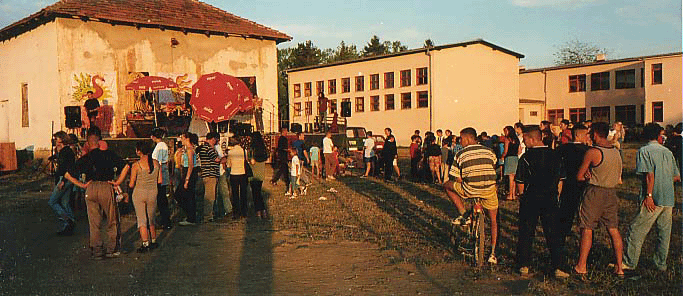 |
The host organizers for the Mitrovice shows were the Multiethnic Youth and Childrens Peace Center. In Donja Gusterica, Will Be Better youth club, supported by Children's Aid Direct made local coordination. At Camp Ereniku, Gjakova Balkan Sunflowers hosted the events. Each night, the traveling artists ate and slept in accommodations arranged by the host groups. KFOR assisted the tour by providing bus transportation for the artists.
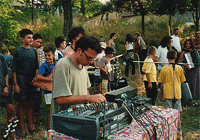 |
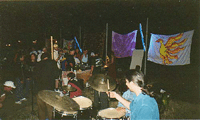 |
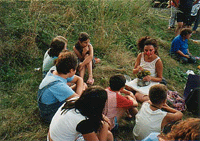 |
Reflections
After every major effort or project, an organizer is left with the hard
self reflective question, "Did we achieve our goals?" With the
Crossing Bridges Festival, so many lessons were learned about how we could
have made it better. Fundraising was made much too late and many potential
donors were unable to support the project. Specific roles and responsibilities
could be more clearly outlined to avoid confusion and crossover, which
is important when working with so many collaborators. Some works, such
as poster art design and distribution, were paid for in full price which
could have been made much cheaper, while other elements which needed professional
teams, like backstage catering and management, were made by volunteers
and came up lacking. The program could have been simplified, which would
have eased the time strain of the performance stages. With a smaller budget
and little more than half of the available tickets sold, there is no leftover
funds for the summer camp benefit this from this festival. As the mistakes
and lessons add up, an organizer easily forgets the whole purpose of the
festival entirely. Then, a few days after the show, someone stops you
on the street, or calls you on the phone, or writes you an email, and
says, "Hey, I don't think you know what you made last Saturday. It
was historical. Thank you!" To bring a humanistic consciousness to
the public through music and theater is a difficult thing to measure.
We have received considerable positive feedback from the participating
artists, the media, and individuals from the public. Only those who experienced
the festival can give a personal account of what inside them may have
been changed from this brief and memorable event.
The Future
It seem inevitable now that the Crossing Bridges Festival will become
a yearly tradition in Peja. All of the guest artists have expressed interest
to return. All of the organizing groups are eager to make it better next
year. The public of Peja would like to have the sequel next month. But
what is the future of Crossing Bridges? A deeper exploration into the
connection between art and human understanding. Could rock concerts stop
the next war here? We'll try. Tasting the passion of artforms from different
places and cultures reminds us that diversity is delicious. Japanese and
Native American groups are interested to join the festival next year.
We would like to expand the range of artistic styles, extend the length
of time of the festival, and bring a more diverse group of artists. We
trust that from this strong beginning, a great future will grow. We thank
all who supported Crossing Bridges in this test run, and hope to see you
all next summer at Crossing Bridges 2.
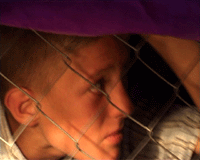
Crossing Bridges Festival 2002
